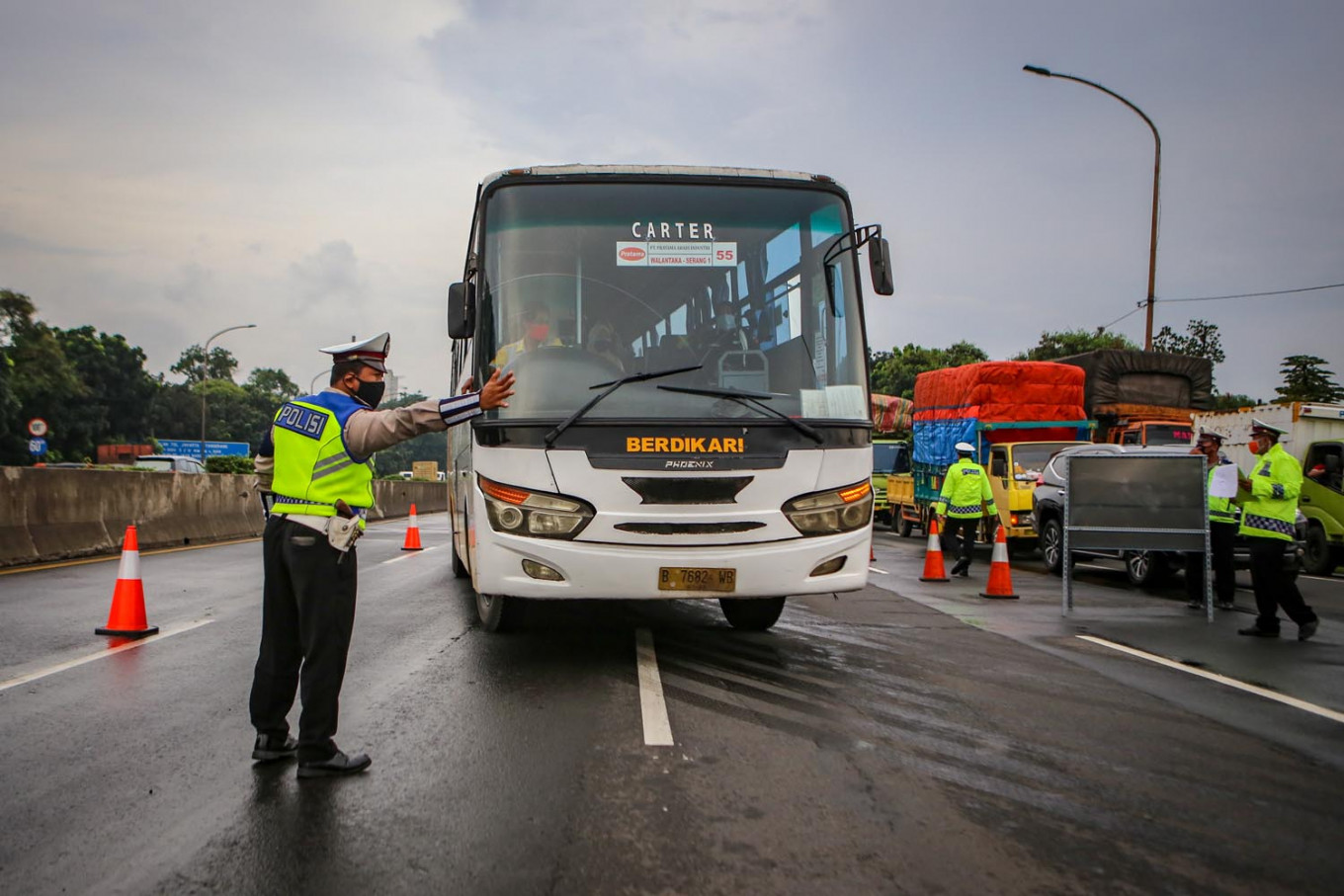Popular Reads
Top Results
Can't find what you're looking for?
View all search resultsPopular Reads
Top Results
Can't find what you're looking for?
View all search results‘Mudik’ ban adds misery to already hurting airlines, bus companies
With the mudik ban, which took effect from April 24 and will last until June 1, travel in and out of virus-hit areas, also known as COVID-19 red zones, is prohibited.
Change text size
Gift Premium Articles
to Anyone
T
he government’s recent decision to ban the traditional Idul Fitri mudik (exodus) has added to the misery of Indonesia’s airlines and other public transportation companies whose businesses have been hammered by the COVID-19 epidemic.
With the mudik ban, which took effect from April 24 and will last until June 1, travel in and out of virus-hit areas, also known as COVID-19 red zones, is prohibited. The ban applies to Greater Jakarta, the nation’s epicenter of the coronavirus outbreak, and other regions that have imposed large-scale restrictions (PSBB).
Although the travel ban technically applies to transportation entering and leaving regions with PSBB in effect it stops most or airline services in the country, adding misery to the already hard-hit industry, the chairman of the Indonesia National Air Carrier Association (INACA), Denon Prawiraatmdja, said on April 23.
The mudik period is considered the harvest season for the country’s transportation companies because of the sharp increase in the number of passengers, especially during the seven days before and after Idul Fitri at the end of the Ramadan.
Prior to the mudik ban, national airlines had been under financial stress because of the sharp decline in passenger numbers since the announcement of the first COVID-19 cases in the country in February, which was later followed by the government’s social-distancing policy including an appeal to work and study from home in the middle of March. According to data from the Finance Ministry, the combined revenue losses among local airlines amounted to Rp 207 billion (US$13.4 million) as of April 15.
“With the mudik ban, the impact will be more severe not only for airlines but for all related business including airports and all business activity inside them,” INACA chairman Denon told The Jakarta Post.
Denon said flight frequency had declined to just 20 percent of normal before the mudik ban was officially imposed. Most airlines have grounded the majority of their fleets as a result of the lack of passengers. Many employees have also been furloughed.
He said that although most of the aircraft were grounded, the airlines still had costs, not only parking fees but also for maintenance services.
Denon, therefore, urged the government to start disbursing the promised financial incentives to enable local airlines keep afloat in this difficult situation.
“Airlines will follow whatever COVID-19 measures the government imposes, but we are begging the government to immediately disburse the relief funds,” he said.
The International Air Transport Association (IATA) in its updated analysis on April 14 estimated that the COVID-19 crisis will lead to drops in airline passenger revenue of $314 billion in 2020, a 55 percent decline compared with 2019.
Garuda Indonesia said in a statement on Friday said it would abide by the government’s mudik ban and it would stop flights to all areas that have imposed PSBB measures, such as Jakarta; Surabaya, East Java; Bandung, West Java; Pekanbaru, Riau; Makassar, South Sulawesi; Padang, West Sumatra; Banjarmasin, South Kalimantan; and Tarakan, North Kalimantan.
“We are still serving passengers on domestic and international routes that are not connected with red zones,” read the Garuda statement.
The mudik ban has also severely affected land transportation.
The managing director of one of the country’s largest bus transportation companies, Lorena-Karina, Dwi Rianta Soerbakti, said that the mudik ban would seriously hurt all public bus companies especially small ones. If there are no incentives or support from the government, Dwi said that 50 percent of land transportation operators would go bust by the time the COVID-19 epidemic ends. “Especially, companies which have to make large repayments to leasing companies and banks,” said Dwi on Friday.
Even before the mudik ban was imposed, Dwi said public bus companies had already suffered a 90 percent decline in passengers. Many operators have also been forced to put their employees on furlough.
“The decision to ban the mudik must be followed by incentive policies that can help transportation companies to survive as all employees and stakeholders will be affected by this decision,” he said.
Lorena-Karina has a total of 400 passenger vehicles and 200 cargo vehicles. However, it has had to park up 95 percent of these vehicles and lay off 80 percent of its employees.
Richard Soehoko from PO Arimbi, another bus company, which serves inter-city routes, said that with the mudik ban, the land transportation business had pretty much come to a halt. The company has cut its bus services by 75 percent and relies only on freight services to survive.
The 2019 mudik saw 18 million people using public transportation during the seven days before and after Idul Fitri, with 5.41 million people traveling by air, 2.85 million by land transportation, 1.17 million by sea transportation, 6.20 million by rail and 2.51 million by ferries.










